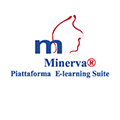TITLE:
ENTREPRENEURSHIP SKILLS AND ATTITUDES
Duration: 2 hours
Content: During the webinar we will describe the important aspects to consider when you want to become an entrepreneur and in detail we will explore: how a business is born: vision, mission and values; the attitudes and skills of the entrepreneur (effective communication, leadership, self-efficacy, managing oneself and/or the group, managing success and failure); entrepreneur, self-employed, freelancer: differences and similarities.
Materials: Handout in electronic format containing copies of slides used during the course; Testimonials from entrepreneurs, lecturers and experts who will address different aspects that characterize entrepreneurial processes: from project management to online promotion and sales, from the importance of teamwork to basic finance knowledge
Mode of delivery: online on the Minerva E-Learning MINERVA® Platform in asynchronous mode
TITLE:
ENTREPRENEURIAL CAPACITY BUILDING
Duration: 2 hours
Content: Entrepreneurial skills are critical to successfully starting and running a business. This course explores the key elements of entrepreneurship, emphasizing the importance of creativity, strategic thinking, problem solving and critical thinking in a context of innovation.
Materials: Electronic handout containing copies of slides used during the course; Testimonials from entrepreneurs, faculty and experts who will address different aspects that characterize entrepreneurial processes: from project management to online promotion and sales, from the importance of teamwork to basic finance knowledge
Mode of delivery: online on the Minerva E-Learning MINERVA® Platform in asynchronous mode
Title: Entrepreneurial Skills
Duration: 2 hours
Content: The “Best Practices for the Successful Entrepreneur” course aims to provide entrepreneurs with the tools and knowledge needed to implement best practices that foster business success. Through this course, participants will learn how to set a clear vision and communicate it effectively, develop flexible strategies that respond to market changes, foster a culture of innovation, encourage intrapreneurship among employees, and integrate social responsibility into business operations. These best practices are key to achieving operational excellence, improving efficiency, increasing customer satisfaction, stimulating growth and ensuring the long-term sustainability of the company. The course explores how these practices can be adapted and applied in different business contexts to maximize results. In doing so, it will look at how these requirements can go cross-cutting and consequently also be applied in favor of the goal that the course in toto sets: promoting sustainability.
Materials: Handout in electronic format containing copies of the slides used during the course; technical documents, e.g., manuals and guides
Mode of delivery: online on the Minerva E-Learning MINERVA®Platform in asynchronous mode


